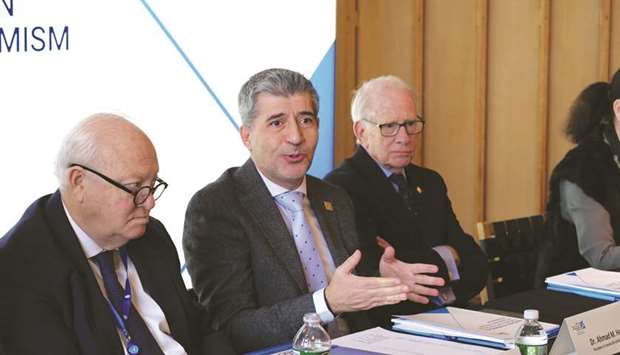Hamad Bin Khalifa University’s (HBKU), a member of Qatar Foundation, organised a high-profile roundtable discussion on the importance of higher education in countering extremism, in partnership with the Institute of International Education (IIE), in New York.
Hosted by IIE on January 14, ‘Educate to Eradicate’ drew on security, political and socio-development perspectives to develop a deeper understanding of the causes and solutions for combating violent extremism. The event also considered the vital but under-represented role that academic institutions and other educators play in tackling extremist behaviour and rhetoric. In doing so, a high-level panel of senior UN officials, academics from New York University, University of Maryland and Columbia University, experts and policymakers identified priority areas for further research and discussion, as well as best practices in relevant policy programming.
The discussion was led by HBKU president Dr Ahmad M Hasnah who navigated attendees through a series of thematic discussions. These began with a high level overview by Miguel A?ngel Moratinos, under-secretary-general of the United Nations, High Representative for the United Nations Alliance of Civilisations (UNAOC) followed by an expert overview of the causes of extremism provided by former FBI agent and founder of the Soufan Centre, Ali Soufan. This was followed by a session on the role of higher education institutions in countering violent extremism.
The support of digital media and other communication channels in higher education’s efforts to counter extremism was demonstrated in a discussion with Dr Raffi Gregorian, director and deputy to the under-secretary- general, United Nations Office of Counter-Terrorism. Proceedings concluded with a session on the practical steps academic entities should take to tackle extremism, which was informed by the insights of Emilio Cassinello, a former Spanish diplomat and director general of the Toledo International Centre for Peace.
Dr Hasnah said, “HBKU was delighted to organise an event that not only attracted leading figures in the fields of counter-extremism and education, but also changed the parameters of the conversation. The fact that Educate to Eradicate took place in New York further demonstrates the university’s growing international profile and interconnectedness with like-minded organisations.
“Extremism has no religion or community, single minded in its pursuit of goals through violent means that harm others, threaten the lives and stability of people all over the world as well as challenging norms and development of communities. There is a need to explore the positive role of education, which is the basis for all development, whether social, economic, or political. Education gives people hope, instils tolerance, critical thinking, and as a result political stability.”
During the roundtable, Dr Alan Goodman, president of IIE, said, “While we can’t be sure that education works every time we know for sure the consequences of not trying.”
“Youth’s engagement in fostering mutual understanding between people of different cultures and religions is crucial in preventing violent extremism. In response to the changing nature of violent extremism, UNAOC’s project activities have evolved into a robust and growing portfolio that tackles the threat from multiple directions,” added, Moratinos.

Dr Ahmad M Hasnah, president of Hamad Bin Khalifa University, during the Educate to Eradicate roundtable held in partnership with the Institute of International Education.
